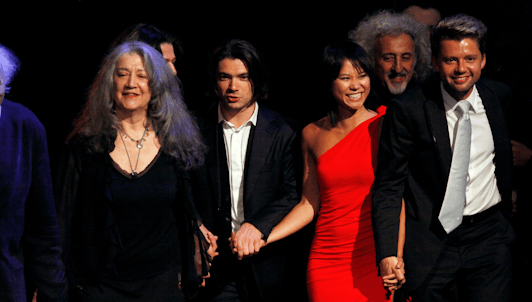Ivry Gitlis is one of the most popular violinists of his time. He has succeeded in combing the integrity of a demanding musical career with original and renewed artistic experiences.
Originally from Ukraine, Ivry Gitlis’ parents settled in Israel in 1921. Ivry Gitlis was born a year later in Haifa. His parents were not musicians yet encouraged musical development in their son by offering him his first violin. His progress was prodigious. He studied with Ms. Velikovsky, (a pupil of Adolf Busch) and gave his first concert at the age of seven. Concerned about completing his musical education, Ivry Gitlis settled in France and was admitted to the Conservatoire in Jules Boucherit’s class. With his diploma under his belt, he decided to perfect his tuition with Georges Enesco, Carl Flesch and Jacques Thibaud.
Once the armistice was signed, Ivry Gitlis gave his debut with the London Phiharmonic Orchestra. While Glenn Gould inaugurated the return of artistic relations between Canada and the USSR in the middle of the 1950s, Ivry Gitlis was, in 1963, the first Israeli violinist to play in a country who often forced its own artists into exile. Ivry Gitlis gave his first tours of the United States with Eugene Ormandy and Georges Szell and recorded the great concertos of his century, (from Berg to Bartok via Sibelius).
Ivry Gitlis then chose to settle in Paris, a city in which his notoriety grew considerably. However, this fame did not in any way distance him from what was most essential. On the contrary, he was impassioned by the music of his era and interpreted pieces written for him like the Pezze per Ivry by Bruno Maderna while promoting the music of Xenakis. Ivry Gitlis is one of a handful of people who bear witness to the exchange made possible through music through his encounters with audiences from all horizons in every continent. He is familiar with numerous musical styles and travels with ease from one to the other founding festivals and encountering all different types of audiences. For this ingenious violinist who also paints and writes, music is not music without communication and immediate sharing.
Award : Grand Prix du Disque for the recording of Alban Berg’s Concerto, To the Memory of an Angel.




